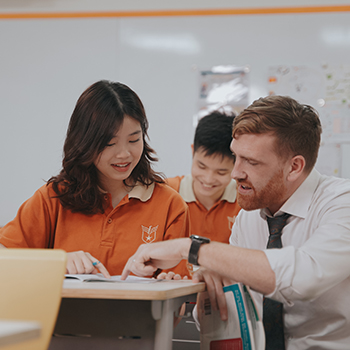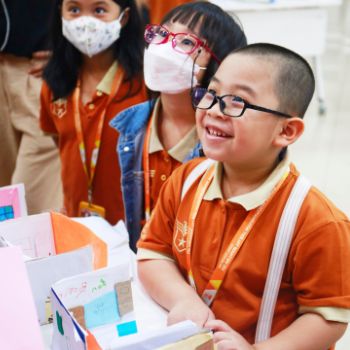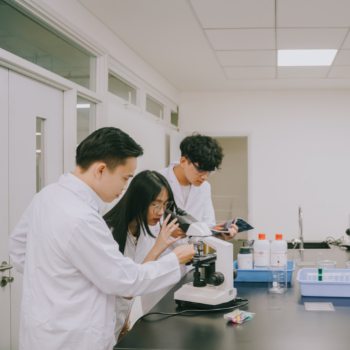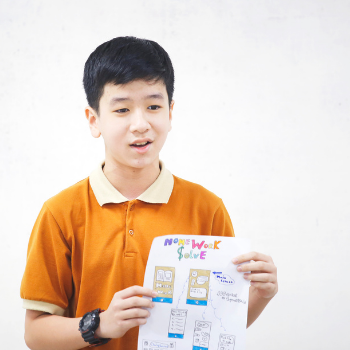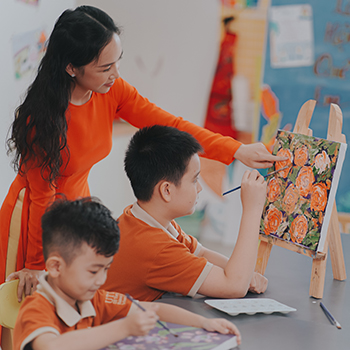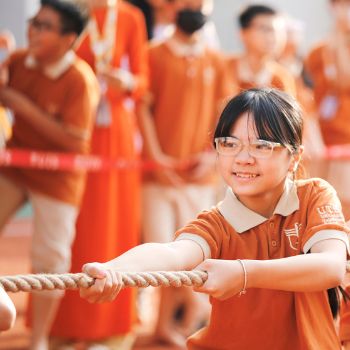UTS Behaviour, Rewards And Sanctions Policy And Procedures
CHAPTER 1 INTRODUCTION AND RATIONALE
1.1 Behaviour, Rewards & Sanctions at US Vietnam Talent International School
At US Vietnam Talent International School, we aim to keep rules clear and consistent. Our approach to rewards and sanctions is based on our UTS 6 Core Values:
6 Core Values
- Integrity: UTS students keep their promises, always respect the truth, and say no to wrongdoings.
- Respect: UTS students respect themselves as well as other individuals. The present world is global, and cultures are interconnected and intertwined. Therefore, students need to understand and respect other cultures while retaining national identity.
- Courage: UTS students are patient, persistent, ready to conquer personal goals and face challenges, confident to express personal views with their own competency.
- Contribution: UTS students apply the knowledge and skills they have learned to benefit themselves, their families and society.
- Lifelong learning: UTS students constantly explore and learn from their surroundings and apply their knowledge and experiences in real life.
- Creativity: UTS students develop the spirit of innovation and creativity and know how to develop and apply new ideas.
At UTS we are a close, friendly community. This Behaviour, Rewards & Sanctions Policy seeks to provide a framework for the UTS student community to learn safely and positively together.
All staff at UTS will seek to create an environment in the school that provides a holistic education:
“At UTS, all our teachers and staff are educators, whose mission is to inspire and nurtures all the talents and personal values of each of our students.”
UTS expects high standards of behaviourA clear Behaviour, Rewards and Sanctions policy is a key part of successful and effective teaching and learning. This policy is designed to:
- Create a positive learning environment
- Provide a suitable Behavior, Rewards & Sanctions Policy
- Promote early intervention and prevent bullying
- Ensure fairness and consistency of response to both positive and negative behaviour
- Ensure that the school’s expectations and strategies are widely known and understood
- Encourage the involvement of both home and school in the implementation of this policy
We expect to receive the approval from parents, students, staff, and governors to work together to achieve the highest standards of behaviour within the school, on school trips and whilst travelling to and from school, in accordance with this policy document.
Students are expected to be polite and show consideration towards each other and towards the surrounding people. A student voice is listened, respected and acknowledged at UTS.
The following principles underpin the student’s behaviour policy:
- Students are required to observe the following basic rules in the classroom:
- Arrive on time with all the equipment needed for the lesson
- Listen when the teacher is giving instructions
- Follow instructions promptly and accurately
- Ask a question when help is needed by raising a hand to gain attention
- Treat others with respect and consideration at all times
- Students are required to dress in accordance with the school’s Uniform Policy.
- Students must follow all health and safety regulations in classrooms and around the school.
- Students should never swear, make racist, sexistor other abusive or humiliating remarks.
- Students must never resort to physical violence, bring illegal items or substances to school.
- Students must avoid behaviour that disturbs and/or distracts others.
- In circumstances when a student has failed to meet the above expectations of the school, there are clear sanctions in place to tackle the unacceptable behaviour.
Our school Rewards System is designed to celebrate and acknowledge achievement in all aspects of the school curriculum.
The Rewards System is based in the reward systems of the Vietnamese National Program and the International Programs and the school’s house system.
1.5 Positive Discipline
“Every child deserves a champion, an adult who will never give up on them, who understands the power of connection, and insists that they become the best that they can possibly be.”
At UTS, we recognize that effective education is inextricably linked to the right approach to student behavior. Student discipline is our active effort to maintain a safe and respectful learning environment. Discipline is the process of working with children, guide, instruct and assist them to be aware of what is right and wrong, what should and should not be done in the school environment and in life – an awareness from within the students themselves, not an imposition from the outside.
To achieve that goal, we apply positive discipline, a moral education technique that assists students in making more progress by having them identify, recognize, and correct their own flaws. These are disciplinary measures based on student respect that teach students about love, responsibility, and fairness.
Positive discipline education focuses on the following:
- Increase students’ sense of initiative
- Increase students’ positive attitudes toward school and school
- Increase student participation in activities inside and outside the classroom
- Reduce the student’s proclivity for aggression
- Teach students how to recognize positive behaviors
- Improve the teacher-student relationship
Parents and students are expected to be aware of and understand the school’s rules regarding acceptable and unacceptable behavior at UTS. Our disciplinary policies are based on the unwavering belief in a humane, non-punitive, and non-violent educational environment. It is the responsibility of all members of the UTS community to create a positive environment in the building, on campus, and at any school event to accomplish this. UTS teachers and staff are instilled with educational equity, consistent expectations, and empathy for the needs of each individual student in classroom management.
We are committed to putting our students’ learning first and will always try to find the best solution so that their learning time is not disrupted.
CHAPTER 2 PRIMARY SCHOOL BEHAVIOUR, REWARDS AND SANCTIONS POLICY (GRADE 1 TO 5)
2.1 Introduction
In the Primary School, we use the UTS 6 Core Values to which all classroom rules, rewards and sanctions are linked:
- Integrity: UTS students keep their promises, always respect the truth, and say no to wrongdoings.
- Respect: UTS students respect themselves as well as other individuals.
- Courage: UTS students are ready to face challenges, confident to express personal views with solid knowledge and skills.
- Contribution: UTS students apply the knowledge and skills they have learned to benefit themselves, their families and society.
- Lifelong learning: UTS students constantly explore and learn from their surroundings and apply their knowledge and experiences in real life.
- Creativity: UTS students develop the spirit of innovation and creativity and know how to develop and apply new ideas.
At the beginning of each academic year, the students are made aware by the homeroom teachers of the 6 Core Values and their associated behaviourial principles above.
2.2 The Reward system
Our school Rewards System is designed to celebrate and acknowledge achievement in all aspects of the school curriculum.
The Rewards System is based in the reward systems of the Vietnamese National Program and the International Programs and the school’s house system.
The Golden Rules cover all forms of behaviour, study, play, and life in and out of Primary School. They are as follows:
2.3.1 In the Classroom
- Coming to class on time. This means that students must sit in their classrooms when the bell rings and follow the school bell hours.
- Attending and completing assigned work on time.
- Completing individual assignments quickly and in order, cooperating well with others for group exercises.
- Following the teacher’s instructions.
- Raising hand to speak and answer only when asked by the teacher. Do not talk over people or interrupt one’s conversation.
- Do not arbitrarily take or use other people’s personal belongings.
- Do not draw or write on desks, walls, etc., and must know how to take care of class and school property.
- Avoid disruptive behaviours such as private talk, banging the table, throwing objects, and other disturbing and distracting behaviours in class.
- Speaking politely and treating friends with courtesy.
- Using appropriate language. Do not use slang or bad language.
- Do not bring food and drinks (except water) into the classroom.
- Do not litter indiscriminately.
- As the classroom is an educational environment, any topics of discussion, opinions or language used must be appropriate. Do not swear or curse.
- Collaborating well with teammates. This means do not behave disrespectfully or disparagingly with those who are in a weaker position. Instead, work together and help them to improve.
2.3.2 Outside the Classroom
- When moving in common areas, corridors or halls, students should walk to the right, yielding their left side to people walking in the opposite direction or in a hurry.
- No jostling or shoving is prohibited.
- Keep the door open for those following you.
- Knock on the door before entering class when class has started.
- Say “thank you”, “please” and use polite language when communicating with others.
2.3.3 Other School Group Activities
Students will have many opportunities to experience a variety of community activities throughout the school year. On such occasions, students need to:
- Gather at their class designated location before the activity takes place.
- Follow the teacher and sit in the right position of their class.
- Cooperate, support, and actively participate in group activities.
- Follow the instructions.
Applause is an appropriate form of support in group activities. Talking in private, whispering, whistling, shouting, stomping, protesting, mocking is all considered rude.
2.3.4 Use of Mobile Phones and personal Electrical Devices*
To ensure optimal learning for all students, students are not allowed to bring cell phones or other personal electronic devices to school unless they are used for educational purposes (to develop 21st century technological skills) when required by teachers/schools. In this case, the school will notify the parent in writing so that the parent can provide the student with the necessary personal electronic device to bring to school and the student must strictly follow the instructions of the teacher regarding the use of such devices.
Violation of the foregoing will result in confiscation of cell phones/electronic devices (as outlined in the next section) and/or other disciplinary action. The school is not responsible for any loss or damage when students bring their cell phones/electronic devices to school.
*Personal electronic devices include but not limited to smart watches and Ipad.
2.3.5 “No touching” Policy
Students must have a serious manner, avoiding behaviours such as being overly emotional with others in public, running, hustling, jostling, etc. The form and level of discipline will be applied depending on the seriousness of the violation.
2.3.6 Money and Valuables
In order to minimize the potential loss of money or valuable items, students should act as follows:
- Do not bring valuables or large sums of money to school.
- Do not leave valuables in personal lockers.
- Do not leave wallets, scrapbooks, calculators, or other valuable items out of sight, even when the classroom is supervised.
The school is not responsible for any loss, misplacement or damage that occurs when students bring valuables or money to school.
2.3.7 Use of School facilities and equipment
Students must have a sense of care in keeping with the means, tools and facilities provided by the school for the student’s use. In case of intentionally causing damage or damage to the means, tools and facilities of the school, the student will be reminded, fined and/or compensated depending on the seriousness of the damage, damage has been caused.
2.3.8 Playground Rules
All activities must take place in the designated areas.
- Following the teacher’s instructions for your own safety.
- Do not push or cause disorder when playing games.
- Leaving bags in the right place in order to avoid the other students tripping.
- Playground equipment should be treated properly and not used in wet or slippery conditions.
- Avoiding using heat-absorbing devices in hot, sunny weather to avoid injury.
- Do not throw rocks, sticks, or other objects that could hurt or injure others.
- Do not wrestle or fight.
- Do not run on footpaths or stairs.
- Do not push other people or jostle.
- Do not chase the ball when the ball runs out of the playing area. In case of need, ask an adult for help.
- Do not play games that are too difficult, violent and dangerous.
- Do not carry a friend on the back or shoulders.
- Do not kick or throw a ball of any kind against the wall, except in the designated area for this activity.
- When gathering to play outside the classroom, students are only allowed to return to class when requested by the teacher.
- Immediately notifying the teacher or anyone for support when dropping or breaking an object or glasses in the playground.
- Being careful when playing with friends. Do not play rough, especially when playing with younger students.
2.3.9 Canteen Rules
- Students are only allowed to eat and drink within the cafeteria. Do not eat or drink outside this area.
- When in the cafeteria, students must not run and must sit in the right place.
- After receiving the meal, students must eat at their designated place. They should not move about, causing disorder and should move only when requested by adults.
- Cleaning the dining table after eating/drinking. Putting food, bottles, cans, and bags in the right place.
- Students are responsible for maintaining general hygiene in the cafeteria.
2.3.10 Bus rules
Discipline on the bus is a shared responsibility of students, parents, and the school. To provide a safe and orderly environment on the bus, students must adhere to these following regulations:
a) The 10 Bus Rules
- Following the instructions of the driver/nanny.
- Getting on and off the vehicle safely.
- Sitting in the correct position and wear a seat belt.
- Do not move about the bus.
- Do not throw items.
- Do not throw items out of the window.
- Keeping order, do not disturb the driver and others.
- Do not use blasphemous, indecent words; do not smoke or carry prohibited objects; do not destroy the school property.
- Do not eat or drink.
- Have a sense of responsibility and safety.
Student travel time is counted as part of the school day. School buses are considered “extensions of the school campus”. Therefore, when students use the bus, they are also on “campus”. Any improper behaviour on the bus may result in suspension from bus rides, school and related school activities.
b) Other related issues
- Parents/guardians are asked to wait for the bus with students until they are picked up by the bus.
- Waiting until the vehicle comes to a complete stop before boarding.
- Always being polite, wait for your turn to board and use the handrail.
- Following the instructions from the driver/nanny and sitting in the correct position.
- Do not stand or walk around while the vehicle is moving.
- Do not leave your seat until the vehicle has come to a complete stop.
- Waiting for your turn, do not gather in the way of others.
- Firmly grasping the handrail.
- Parents/guardians of students must be present at the pick-up point to pick up their children.
c) Disciplinary procedures for violations on buses
- Warnings from the driver/nanny.
- Conference with the driver/nanny after other students get off the bus.
- The student is placed to sit in the front seat.
- The student is sent to the school office, parents are notified of the student’s violation.
2.3.11 Other Rules
- Respecting all teachers and school staff.
- Following the school’s rules and regulations.
- Complying with regulations on social order and safety in the school campus.
- Studying hard, always completing the assigned work. Taking care of the student’s own health, personal hygiene, and the surrounding environment.
- Always maintaining and promoting exemplary behaviour. When making a mistake, courageously admit it and correct it.
- Do not give up and compromise on negative behaviours.
2.4 The UTS Levels of Response
Discipline is not punitive, arbitrary, confusing, or coercive. Discipline is the process of working with children, helping them to be aware of what is right and wrong, what should and should not be done in the school environment in particular and in life in general. Discipline is about improvement and reconciliation. The goal of discipline is to guide, instruct and assist students to improve their sense of compliance with school rules and regulations – an awareness from within the students themselves, not an imposition from the outside.
The discipline process includes the following four basic elements:
- Show students what they have done.
- Develop a sense of self-responsibility in the children.
- Give them the opportunity to solve and overcome violations.
- Respect and uphold their dignity.
The following sections describe in detail violations, the disciplinary process, and possible consequences, ranging from low-level, less serious to most severe cases. To the extent permitted, disciplinary measures are used as a form of instruction to improve, encourage, and shape student behaviour in the future. In all cases, the officials responsible for maintaining order and discipline in the school will conduct a thorough, fair and consistent investigation, taking into account the following factors:
- The age of the student who violated the discipline, the level of knowledge and previous forms of discipline (if any).
- The nature of the particular incident, the extent of the consequences, and especially whether the violation was intentional or not.
2.4.1 Level 1
a) Level 1: Violation
- Frequently teasing friends or people around and/or addressing them inappropriately.
- Harassing others on school grounds and/or on the bus.
- Using inappropriate speech, gestures, or having disorderly conduct in school, in the classroom and/or on the bus.
- Making verbal or/and written statements or taking actions that disrupt the learning and teaching process.
- Often being late to school.
- Failing to wear the correct uniform or appearance that is not appropriate for the student’s age (hair dye, nail polish, pedicure or excessive makeup).
- Failing to prepare books and/or school supplies.
- Carelessly using or using electronic devices or computers without permission or in violation of school regulations.
- Negatively affecting other students.
- Littering indiscriminately.
b) Level 1: Disciplinary
Depending on the seriousness of the violation, one of the following disciplinary forms will be applied:
- Verbal warning, included with other disciplinary measures such as confiscation of electronic devices, changing seat in class or on the bus.
- Written warning.
- The student writes a conduct report.
- Notice to parents.
- Conference with parents (with meeting minutes where parents and the school agree and commit to measures to help the student improve his/her behaviour)
- Denial of certain privileges.
2.4.2 Level 2
a) Level 2: Violation
- Level 1 recidivism.
- Threatening or harassing/bullying other students.
- Fighting or swearing
- Frequent violations of classroom rules, playground rules or bus rules (applicable only to students using bus services).
- Continuously disrupting the teacher’s teaching process or unduly interfering with the teacher’s authority in the classroom.
- Behaving disrespectfully or disobeying school staff – challenging, refusing to follow the teacher’s instructions.
- Cheating or plagiarizing.
- Continuously being truant from school.
- Using profanity/obscene language or behaviour.
- Throwing or hitting objects that cause injury to others.
- Careless or arbitrary using, losing, or damaging the school’s property or facilities.
b) Level 2: Disciplinary
- Continuation of level 1, more severe disciplinary forms.
- Notice to parents and/or conference with parents.
- Suspension from school.
- Suspension from participation in sports activities.
- Suspension from school bus access (applied only to students using the bus service).
- Suspension of 3 school days (excluding truancy days). Tuition fees for the days the student is suspended from school or suspended from school activities will not be refunded.
2.4.3 Level 3
a) Level 3: Violation
- Level 2 recidivism.
- Fighting and/or causing injury.
- Harassing, including but not limited to the following: race, colour, body shape, nationality, ethnicity, religion, belief, disability, or sex.
- Committing theft, robbery inside and outside the school.
- Infiltrating or using school equipment or facilities without permission.
- Vandalizing personal or school property.
- Bringing weapons-like items to school.
b) Level 3: Disciplinary
- Continuation of level 2, more severe disciplinary forms.
- Compensation for damage.
- Not allowed to enter the classroom for 1-5 school days as decided by the School Leadership Team depending on the seriousness of the violation. Tuition fees during this period will not be refunded.
2.4.4 Level 4
a) Level 4: Violation
- Level 3 re-violation acts.
- Possessing, using, or selling illegal drugs/drugs or drugs that are harmful to the student and other people’s health, including but not limited to products such as stimulant drugs, opium, marijuana, heroin, etc.
- Possessing and bringing a dangerous weapon to the school campus or a school event.
- Having severely violent behaviors towards other students or school personnel.
- Deliberate setting off the school fire alarm.
b) Level 4: Disciplinary
- Continuation of level 4, more severe disciplinary actions.
- Compensation for damage.
- Suspension from school for 1 week. Tuition fees during the period of student suspension will not be refunded.
2.4.5 Level 5
a) Level 5: Violation
- Level 4 recidivism.
- Deliberately committing theft, robbery, mugging, etc.
- Fighting in a group, using weapons to cause injuries.
- Deliberately setting fire to the school property.
b) Level 5: Disciplinary
- Continuation of level 4, more severe disciplinary actions.
- Compensation for damage.
- Suspension from school for 1 year.
c) Other cases of expulsion
The school reserves the right to expel a student under these following circumstances:
1) The student has a medical condition such as an emotional, or behavioral disorder, a learning limitation, or any other impairment that affects their learning ability and the learning environment of other students including intellectual disability, autism, or ADHD, which is discovered during school time, or because parents did not detect or notify the school before the student starts school officially. Because such conditions are hard to be diagnosed, the school will decide to suspend the student and the family is responsible for sending the student home for treatment and to a specialized setting appropriate to the medical condition on the following basis:
(i) the assessment results by an appropriate functional unit or a medical record or the opinion of a medical specialist,
(ii) and/or the opinions of the majority of teachers are currently teaching the student with signs of illness.
If there is any conflict between (i) and (ii), (ii) shall prevail.
2) In cases where the school finds out that parents deliberately provide false information to gain admission for their child or for other purposes.
CHAPTER 3 SECONDARY SCHOOL BEHAVIOUR, REWARDS AND SANCTIONS POLICY (GRADES 6 TO 12)
In classroom and school, we aim to model and promote positive behaviour towards each other at every opportunity. We encourage each student to take responsibility for their learning and to show respect for themselves, for their peers and for their environment.
Positive behaviours are acknowledged and celebrated in a variety of ways, within the class and within the wider school community. Our approach to rewards and sanctions is based on our 6 Core Values:
- Integrity: UTS students keep their promises, always respect the truth, and say no to wrongdoings in society.
- Respect: UTS students respect themselves as well as other individuals. The present world is global, and cultures are interconnected and intertwined. Therefore, students need to understand and respect other cultures while retaining national and individual identities.
- Courage: UTS students are patient, persistent, ready to conquer personal goals and face challenges, confident to express personal views and competent at foreign languages.
- Contribution: UTS students apply the knowledge and skills they have learned to benefit themselves, their families and society.
- Lifelong learning: UTS students constantly explore and learn from their surroundings and apply their knowledge and experiences in real life.
Creativity: UTS students develop the spirit of innovation and creativity and know how to develop and apply new ideas
3.2. Reward system
Our school Rewards System is designed to celebrate and acknowledge achievement in all aspects of the school curriculum.
The Rewards System is based in the reward systems of the Vietnamese National Program, the International Programs and the school’s house system.
Discipline at UTS carries with it an aspect of moral guidance and refers to those reasonable controls which promote the individual student’s development and self-discipline with the 6 core values in mind. The purpose of discipline is to promote character training and to provide a classroom situation conducive to learning. Discipline is said to be maintained in a classroom or school when students work cooperatively with the teacher and their companions towards the attainment of the class and school objectives. The legitimate interest of the school extends beyond the school day and beyond the school hours. A student is a UTS student at all times. A student who engages in conduct, whether inside or outside the school, that is detrimental to the reputation of the school may be disciplined by school officials.
3.4 Appropriate Student Behaviours
It is the responsibility of the student:
- to comply with the rules of the school/classroom
- to pursue the prescribed course of study
- to respect and respond to the authority of the teacher and other school personnel
- to arrive at school on time
- to be alert and responsive to directions
- to be courteous to fellow students and staff members
- to respect school property
- to respect the rights and property of others
- to keep your hands, feet, and objects to yourself.
- to not bring food, gum, or drinks to class (except water). Do not eat morning or afternoon snacks in class.
- to keep backpacks on your desk and relevant school supplies in your desk. All other school material should be kept in your locker.
- to not bring any sharp objects (including but not limited to knifes, weapons, etc.) to school.
3.5 Lockers
Every student is given use of a locker outside their classroom for the duration of the school year on the first day of school.
Students are given opportunities to get their set of books before the first period starts, during breaktime, and after lunch. Students should not go to lockers between class unless there is a requirement from teachers.
- The locker area is a crowded area, and all care should be taken to be respectful of everyone.
- Any shoving or other discourteous behaviour at the locker is not allowed
- Care of belongings is expected; a lock for the locker should be prepared by the students.
- Under no circumstances should a student enter the locker of another student without prior permission. Respect the belongings of others.
- No food or liquid should be placed in the lockers.
- The lockers are the property of the school and therefore should not be decorated with anything that cannot be removed easily at the end of the school year (for example no stickers or writing should be placed on the lockers). For birthdays, students may decorate a friend’s locker with wrapping paper, ribbons, and a simple message. Birthday decorations may be left on the locker for 1 month. Blue painter’s tape must be used, and any damage caused by tape, writing, or decorations will be billed to the student responsible for it.
3.6 Uniform Code
- All UTS students are expected to conform to the school dress code as shown in the school handbook.
- For secondary and high school students, the most common infractions include:
1) Skirt too short (girls)
2) Excessive bagginess or sagging (boys)
3) Incorrect outfit (regular vs PE uniform)
4) Lacking correct uniform parts
5) Off-coloured uniform components
Procedures for phones and other personal electronic devices:
- Phones and other electronic devices may not be used anywhere on campus during a school day unless specifically directed to do so by their respective teacher (from 7:50 am until the students leave campus after dismissal time of that school day).
- Phones and other electronic devices may not be used DURING any other curricular and extracurricular activity unless specifically directed to do so by their respective teacher.
- Students are allowed to use school computers equipped in areas such as libraries, project areas, etc., for academic purposes only.
- Should a parent or guardian need to contact their student, the first point of contact should be the homeroom teacher or office staff to gather the attention of the student.
*Personal Electronic Devices include but not limited to devices such as smartwatches and Ipad.
Secondary school (grades 6-9) will not be allowed to use their personal electronic devices such as phones, iPads, smartphones, etc., on campus without prior approval from the homeroom teacher.
- If necessary, teachers may request use of the devices from the homeroom teachers, but they must collect and return all devices at the end of the period.
- Any use of personal electronic devices on campus will result in confiscation.
For High school (grades 10-12): Students are allowed to keep their own devices, but they must comply with the school rules and regulations.
- Students are allowed to use their personal electronic devices only within the classroom for academic purposes.
- Any use of personal electronic devices for purposes other than educational needs will result in confiscation. Personal electronic devices are not to be used during break time.
- Depending on behavior of students, additional privileges may be earned.
The school will not be responsible for devices that are lost, stolen, or damaged. Because of their fragility and costliness, it is recommended that devices not be brought to school at all unless explicitly told to do so by their teacher.
If a phone or and any electronic device is seen or heard within these off-limits times or places, it will be confiscated.
3.7.1 First violation:
- The electronic device will be confiscated immediately and brought to the supervisor with the attached minutes.
- The supervisor will call the student’s parent to alert them that the electronic device was confiscated. The parent will receive the confiscation minutes and sign it. The duration of confiscation is one week.
- Confiscated devices will be sealed by the student and supervisor. It is then kept in a safe under surveillance cameras.
- After the confiscation period, the unsealed electronic device will be released to the student or parents – with written confirmation. UTS absolves itself of any responsibility in the case of damage after the confiscation period.
- The student will receive a 30-minute detention.
3.7.2 Second violation:
- The electronic device will be confiscated immediately and brought to the supervisor with the attached minutes.
- The supervisor will call the student’s parent to alert them that the phone was confiscated. The parent will receive the confiscation minutes and sign it. The duration of confiscation is one month.
- Confiscated devices will be sealed by the student and supervisor. It is then kept in a safe under surveillance cameras.
- After the confiscation period, the unsealed electronic device will be released to the student or parents – with written confirmation. UTS absolves itself of any responsibility in the case of damage after the confiscation period.
- The student will receive a 60-minute detention.
3.8 The School and Private Property
School property (including but not limited to desks, lockers, restrooms, equipment, etc.) is to be treated with respect and shall not be intentionally defaced or destroyed. The defacement or destruction of school property will require the student to return the property to its original state and may result in a referral or suspension depending on the seriousness of the offense.
Regarding sharing classrooms, any private or school property being kept in a classroom is to be respected.
Any property found in a desk or in a common area should be immediately turned into a teacher or office staff so that the owner may hopefully be found. The lost items will subsequently be placed in the Lost and Found cabinet in the school lobby. If it is discovered that property was found and kept, damaged, or destroyed by another student, disciplinary action will be taken. Depending on the severity of the action at hand, the penalties lead up to lower student’s conduct and potentially suspension from UTS.
3.9 Disciplinary Measures
Discipline at UTS carries with it an aspect of moral guidance and refers to those reasonable controls which promote the individual student’s development and self-discipline with the 6 core values in mind. The purpose of discipline is to promote character training and to provide a classroom situation conducive to learning.
3.9.1 Warning
UTS understands that students often grow by trial and error, so there will always be mistakes that the students themselves are not aware of or unintentionally commit. In case the errors do not seriously affect themselves and the surrounding people, students will be given a warning. This helps students recognize the right and wrong in their behaviors and make timely adjustments.
3.9.2 Conduct report
For serious violations that affect the student themselves and the surroundings or the repetition of non-serious errors, students will be asked to write a conduct report to acknowledge the seriousness of their behavior. The form of discipline is also often applied concurrently but not mandatory with other measures such as positive discipline, detention at school, etc.
3.9.3 Positive Discipline: Building Character Across our School (BCAS) Slip
Certain behaviours are infractions against our school culture and policies. When an infraction occurs teachers, staff and administrators use the BCAS slip to help document and communicate to the student and parent what happened and explain the consequence.
3.9.4 Student’s Conduct Reassessment
With particularly serious violations that adversely affect the student themselves and the surroundings or multiple deliberate violations disregarding the school’s rules, the school will have to lower the student’s level of conduct.
3.9.5 Suspension
This is the highest form of discipline applied to severe violations, endangering the students themselves and their surroundings. The implementation of the student’s suspension and consideration of the duration of the suspension will be made at the discretion of the School Disciplinary Committee.
The gravity of a suspension requires that, at the time of the suspension:
- A notice shall be given to the parents by telephone or in person followed within a reasonable time by a written notice signed by the Principal.
- All work missed by the suspended student must be completed and will be graded by the teachers.
A suspension is a conduct issue, not an academic issue.
- A suspension results in the automatic removal of Excellent Student Status (Học sinh giỏi)
- Students with a suspension may be excluded from eligibility for honors for the year.
- Students can be suspended for the infractions listed in the suspension category below, as well as any other serious infraction at the discretion of the principal.
3.9.6 Other disciplinary measures
For each specific violation, teachers and staff may incorporate the following disciplinary measures:
- conference with parents
- assignment of special tasks
- denial of privileges
- Ineligibility from athletic participation and/or other extracurricular activities
- Loss of social activities
- Loss of field trip privileges
- detention
3.10 Levels of Disciplinary Response
Level 1- Warnings, Reminders and Requests to reflect on the misconduct
Teachers/Staff may give a student a warning if they are not following the educational plan/ classroom expectations. If the warning is not sufficient in changing the student’s behaviour, then the teacher/staff will move to the next level.
Level 2- Detention
Depending on the level of infraction a teacher/staff/administrator has the discretion to assign a verbal reminder or a BCAS/detention. Behaviors that may result in detention:
- A commitment of 03 different infractions in level 1 within 30 days.
- A commitment of the same infraction twice in a row within 30 days.
Serving a Detention:
- Detention is served in the room of the issuing teacher or the Vice Principal Office. Detentions will always consist of a dialog between the student and issuing teacher
- Tardy and uniform detentions will be served during a Tuesday or Thursday detention after school with the Vice Principal and will preclude the student from participating in any club or extra-curricular activity on that day.
- The Vice Principal as well as the homeroom teacher are responsible for keeping track of the BCAS slips.
What may happen during a Detention?
- A service
- An assignment given by the teacher (writing a conduct report, doing homework, etc.)
- Both a service and an assignment may be assigned.
Level 3- Conduct Report
A conduct report will be requested by the issuing teacher/staff member and signed by the student, the supervisor, and the homeroom teacher. The referral is to be returned to the supervisor with the parent’s signature on the next school day.
The following are a few of the behaviours that may result in a conduct report:
- Repeatedly committing the same infraction in level 1 three times within 30 days, or committing a total of 5 infractions in level 1
- Students use inappropriate language, swear or cuss.
- Students do not keep distance or a positive self-image, show affection on the school grounds and in front of the school gates.
- Inappropriate attitudes such as leaving the class without permission, not cooperating with the teacher (refusing to comply with the teacher’s request).
- Students use electronic devices at the wrong time or for inappropriate purposes.
- Calling someone by another name to ridicule or insult.
- Boycotting, isolating, and alienating someone.
- Writing or speaking ill of someone in public.
- Ordering someone in class to serve at one’s request, such as being on duty or doing homework, showing answer keys, buying food, etc.
- Racism (mocking others about differences in ethnicity, skin color, language, etc.)
- Slandering, spreading rumors about others.
- Writing or drawing about another person despite knowing that it will affect that person.
- Using other people’s belongings, money, or property without their consent.
- Teasing or intimidating
- Throwing things at someone (furniture, utensils, food, etc.)
- Sending hurtful messages over the phone or on the Internet.
- Intentionally blaming others, affecting their reputation and personal image.
These behaviours may include such consequences as reminders, warnings, detention, and suspension. The supervisor is responsible for maintaining the conduct reports.
Level 4- Lowering Student’s Level of Conduct
For violations that cause serious consequences, or adversely affect themselves, others, or the school, the student is required to write a conduct report and have their conduct lowered one level if they commit one of the following infractions:
- Repeatedly committing the same infraction in level 3 three times throughout the school year.
- Truancy, absence from school without a legitimate reason, sneaking out of the school.
- The student commits consequential dishonest acts (faking signatures, faking illness, giving incorrect reasons for their absence from class or school, making false statements, being late, absent from class or school without permission, etc.)
- Dishonesty in examinations such as copying, cheating; Plagiarism.
- Playing violent and dangerous games.
- Failing to follow or intentionally not following instructions given by teachers, and office staff in emergency cases.
- Bringing dangerous objects into school such as weapons, dangerous toys, and objects that can cause injury.
- Violating traffic safety regulations when driving such as: not wearing helmets, running red lights, swerving/bouncing on the road, speeding recklessly, carrying more than the prescribed number of people, etc.
- Threatening to harm others on social networking sites.
- Extorting someone’s money, forcing him/her to give it to the student.
- Deliberately damaging or destroying private or school property of others.
- Blackmailing
- Insulting, showing disrespect to teachers, office staff, and other students in any form (directly or indirectly, through social networks or on the Internet in general, using applications in electronic means of communication, etc.)
- Posting falsified comments, photos, videos, or personal secrets of others on social media or other websites that hurt or embarrass others.
- Posting obscene or objectionable images and videos of themselves.
- Posting on social media comments or content that are violent, hateful, or discriminatory about any ethnicity or religion.
- Logging into someone’s social account and using it without consent.
- Impersonating others on social media that affects other people’s images.
Level 5- Suspension
The following behaviours may result in a suspension:
- Committing the same infraction in level 4 twice throughout the school year.
- Committing illegal acts such as smoking (including vaping), failing to comply with traffic safety laws, possessing, using illicit drugs, alcohol, depraved cultural products, gambling, or betting in any form.
- Stealing private or school property.
- Failing to comply with regulations on fire safety, setting off the fire alarm, and firefighting equipment.
- Sexual harassment, deliberately touching other people’s private parts.
- Violating Vietnamese law: participating in groups to steal, rob, cause injury to others, committing crimes and being arrested by the police, or committing other wrongdoings that have an equivalent level of harm.
- Destroying school property, causing serious consequences.
- Fighting, intentionally hurting others (hit, kick, slap, pinch, etc.)
The school acts ‘in loco parentis’ during the school day. This means that the school acts in the best interests of the student in place of the parent, as they relate to the child’s safety and wellbeing, in addition to following at all times the laws and regulations of Vietnam.
Secondary and High School Discipline Behaviour, Rewards And Sanctions Policy
All teachers will follow the UTS Behaviour, Rewards and Sanctions policy, as well as establish their own classroom standards, policies, and procedures. Students must adhere to these rules.

